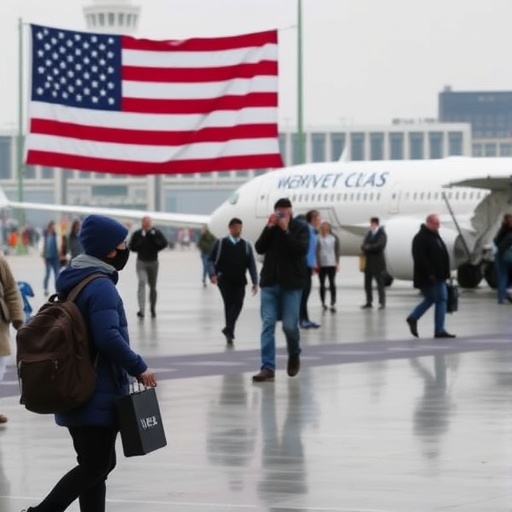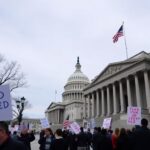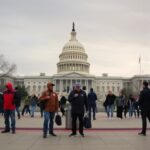US Government shutdown Day 21: 750,000 Federal Workers Unpaid as Flight Delays and Family Hardships Escalate
In a stark reminder of political gridlock’s human cost, the U.S. Government shutdown has dragged into its 21st day, stranding over 750,000 federal workers without paychecks and triggering a cascade of disruptions from airport flight delays to families rationing groceries. As Congress remains deadlocked on funding disputes, the economy teeters, with experts warning of billions in lost productivity and mounting national anxiety.
- Federal Workers’ Paychecks Vanish: Stories of Desperation Emerge
- Flight Delays Soar: TSA and FAA Workers Strain Under Unpaid Burden
- Economic Fallout Deepens: Billions Lost in Productivity and Consumer Spending
- Political Standoff Escalates: Lawmakers Trade Barbs Over Shutdown Blame
- Paths to Resolution: Experts Predict Endgame and Long-Term Reforms
Federal Workers’ Paychecks Vanish: Stories of Desperation Emerge
The Government shutdown, now the longest in modern U.S. history, has left federal workers in limbo, their biweekly paychecks frozen amid partisan battles over border security and spending bills. According to the Office of Personnel Management, approximately 800,000 federal employees were initially furloughed or working without pay, but the figure has stabilized around 750,000 as some essential services grind on. These workers span agencies from the Department of Defense to the National Park Service, embodying the diverse backbone of American governance.
Take Sarah Jenkins, a 42-year-old IRS auditor from Virginia, who shared her plight in a viral social media post. “I’ve got two kids and a mortgage—21 days without pay means we’re dipping into savings we don’t have,” Jenkins told reporters outside the Capitol. Her story echoes thousands: federal workers turning to food banks, delaying medical treatments, and even selling personal belongings to make ends meet. The National Treasury Employees Union reports that 70% of affected workers live paycheck to paycheck, exacerbating the financial strain in an already volatile economy.
Statistics paint a grim picture. A recent Brookings Institution analysis estimates that the shutdown has cost federal workers an average of $4,000 each in lost wages so far, totaling over $3 billion nationwide. For those in lower-wage roles, like USDA inspectors earning around $50,000 annually, the impact is devastating. “These aren’t abstract numbers; they’re families skipping meals,” said economist Dr. Elena Ramirez during a CNN interview. The politics of the shutdown, fueled by disagreements on immigration funding, have turned these personal crises into national headlines, with lawmakers on both sides dodging blame.
Beyond immediate pay issues, long-term effects loom. Credit scores are plummeting as bills go unpaid, and mental health experts note a surge in stress-related illnesses among federal workers. In Washington D.C. alone, local charities have reported a 40% uptick in assistance requests from government employees, highlighting how the shutdown ripples through communities dependent on these salaries.
Flight Delays Soar: TSA and FAA Workers Strain Under Unpaid Burden
Air travel, a cornerstone of the American economy, is buckling under the weight of the government shutdown, with flight delays plaguing airports from coast to coast. The Federal Aviation Administration (FAA), operating with a skeleton crew of unpaid air traffic controllers, has issued warnings of potential safety risks as fatigue sets in after three weeks without compensation. Major hubs like Atlanta’s Hartsfield-Jackson and Chicago’s O’Hare have seen average delays climb to 45 minutes, up from 20 pre-shutdown, according to FlightAware data.
TSA screeners, deemed essential and thus working without pay, are at the forefront of the chaos. Over 50,000 Transportation Security Administration employees continue daily duties, but morale is cratering. “We’re showing up because people need to fly, but how long can we last?” asked TSA officer Mark Thompson in an exclusive interview with The Washington Post. Incidents of longer security lines—some stretching over an hour—have led to missed flights and frustrated passengers, with airlines reporting 15% more cancellations tied to staffing shortages.
The broader aviation sector feels the pinch too. The FAA’s unpaid workforce of 45,000 is managing reduced runway inspections and delayed certifications for new aircraft, raising concerns from the Air Line Pilots Association. “Safety can’t be compromised for politics,” union president Captain Jason Dahl stated in a press release. Economically, these flight delays are costing the airline industry an estimated $200 million daily, per the U.S. Travel Association, as delayed cargo and tourism grind to a halt.
Passengers bear the brunt: families reuniting for holidays face uncertainty, and business travelers lose precious hours. In one high-profile case, a delayed flight from New York to Los Angeles stranded 300 passengers overnight, sparking outrage on Twitter with hashtags like #ShutdownDelays. As the government shutdown persists, aviation experts predict worsening bottlenecks unless Congress acts swiftly, underscoring how federal workers’ unpaid labor keeps the skies open—but at what cost?
Economic Fallout Deepens: Billions Lost in Productivity and Consumer Spending
The government shutdown’s tentacles extend far beyond Washington, strangling the U.S. economy with lost productivity and curtailed spending. Economists from the Congressional Budget Office now project a $11 billion hit to GDP by the shutdown’s end, with each additional day adding $160 million in damages. Federal workers, many in high-cost areas like the D.C. metro, are slashing discretionary purchases—dining out, vacations, even holiday gifts—rippling through retail and service sectors.
Small businesses near federal installations are reeling. In Quantico, Virginia, home to a major Marine Corps base, local shop owner Lisa Chen reports a 30% sales drop. “Our regulars are federal workers who can’t afford extras right now,” she explained to NPR. Nationally, the National Federation of Independent Business warns of 1 million job losses if the shutdown lingers into the new year, as suppliers to government contractors face payment delays.
Key sectors amplify the pain: National parks, closed to visitors, have lost $500 million in fees and related tourism revenue, per the U.S. Travel Association. Research funding at the NIH is stalled, delaying medical breakthroughs, while the Small Business Administration’s loan processing has halted, stifling entrepreneurship. “This isn’t just politics; it’s economic sabotage,” Federal Reserve Chair Jerome Powell remarked during a recent testimony, emphasizing how the shutdown erodes consumer confidence indexed at a three-year low.
Inflationary pressures add insult to injury. With federal workers borrowing more—credit card debt up 12% in shutdown-affected states, per Equifax—the risk of a spending slowdown grows. Wall Street reflects the unease: the Dow Jones dipped 2% in the past week amid shutdown fears, with investors eyeing the politics of budget negotiations. As families suffer, the economy’s fragility is laid bare, demanding urgent resolution to avert deeper recessionary signals.
Political Standoff Escalates: Lawmakers Trade Barbs Over Shutdown Blame
At the heart of the 21-day government shutdown lies a bitter political divide, with Democrats and Republicans entrenched in a standoff over border wall funding and discretionary spending. House Speaker Nancy Pelosi has accused the Trump administration of holding the nation hostage, stating in a floor speech, “This shutdown is a choice by one man to prioritize a wall over American workers’ livelihoods.” President Trump, in turn, fired back on Twitter: “Democrats must fund border security or the shutdown continues—simple as that.”
The impasse stems from a $5.7 billion request for the southern border wall, clashing with Democratic demands for DACA protections and increased disaster aid. Senate Majority Leader Mitch McConnell has blocked multiple funding bills, citing procedural hurdles, while progressive voices like Sen. Bernie Sanders decry the “cruelty of unpaid federal workers caught in partisan games.” Polls from Gallup show public approval for handling the shutdown at a dismal 29%, with 60% blaming congressional Republicans.
Lobbyists and interest groups weigh in heavily. The U.S. Chamber of Commerce urged bipartisan action in a letter to lawmakers, warning of “irreparable harm to the economy.” On the Democratic side, Rep. Alexandria Ocasio-Cortez rallied supporters outside the Capitol, emphasizing, “Federal workers aren’t pawns in this political theater—they’re the heroes keeping our country running.” The blame game has intensified media coverage, with cable news dedicating 40% of airtime to shutdown politics, per Media Matters.
Behind closed doors, negotiations falter. A White House meeting last week ended in acrimony, with no progress on compromise bills. As midterms’ echoes fade, the 2020 election looms, turning the shutdown into a high-stakes political weapon. Veterans’ groups, affected by VA payment delays, add pressure: the American Legion called for “immediate pay for our public servants who serve alongside our troops.” The deadlock not only prolongs suffering but tests the resilience of American democracy.
Paths to Resolution: Experts Predict Endgame and Long-Term Reforms
As the government shutdown surpasses three weeks, glimmers of hope emerge amid the gloom, with mediators suggesting a breakthrough could come via a short-term funding bill or court intervention. Bipartisan talks, brokered by Senate moderates like Susan Collins and Joe Manchin, propose a three-month continuing resolution to reopen agencies while debates continue on immigration. “Compromise is inevitable; the question is how much pain first,” political analyst Norman Ornstein told MSNBC.
Looking ahead, the shutdown’s scars demand reform. Proposals include automatic pay protections for essential workers during future lapses, as floated in a bill by Sen. Mark Warner. Economists advocate for a “shutdown insurance fund” to mitigate GDP hits, drawing from European models. For federal workers, back pay is guaranteed once resolved—ensuring retroactive wages—but the psychological toll lingers, with unions pushing for mental health stipends.
On the flight delays front, the FAA plans ramped-up staffing post-resolution, but airlines like Delta and United warn of weeks-long recovery. Broader economy watchers, including Moody’s Analytics, forecast a 0.2% GDP shave for Q1 2020 if resolved soon, but prolonged shutdown could double that. Politically, the crisis may catalyze 2020 campaign themes, with candidates like Elizabeth Warren vowing “no more shutdowns on my watch.” Families, from furloughed parents to delayed travelers, await relief, underscoring the urgent need for governance that puts people over politics. As negotiations intensify, the nation’s eyes remain fixed on Capitol Hill, hoping for an end to this self-inflicted ordeal.








